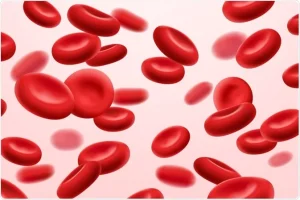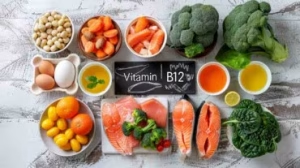
Vitamin B12 Deficiency Can Cause Anaemia: Symptoms You Can’t Miss!
Vitamin B12 is often overlooked but is an essential vitamin needed for good health. Here’s what a deficiency can do to your body.
Have you been feeling tired lately? Do you have bone pain for no reason? Well, your body may not have some nutrients. These foods, which increase energy to ensure better functioning of brain cells, provide energy to your entire body. Vitamin B12 is one of the most important vitamins for your body. Lack of this vitamin can put you at risk! Learn more about how vitamin B12 deficiency affects your body and what you can do about it.
What is Vitamin B12?
Vitamin B12 or cobalamin is necessary for the production of red blood cells and DNA in the body. It also plays an important role in the central nervous system, including the brain and spinal cord. Not only that, vitamin B12 is also necessary for healthy skin, hair and nails. Your body usually does not produce vitamin B12 and you need to get it from medications or certain foods that contain this vitamin.
According to the National Health Service, this vitamin can be stored in your body for up to four years. It is also water-soluble, so if you have too much of it in your body, your body will excrete it through urine. However, inadequate intake of vitamin B12 can lead to impotence. Vitamin B12 deficiency occurs when the levels of the vitamin in your body are too low to meet your daily needs.
What is vitamin B12 deficiency?
Vitamin B12 is an essential nutrient the body needs to create energy, process DNA and support nerve function, according to the National Institutes of Health. Levels of this vitamin below 200 picograms per milliliter (pg/mL) are considered inadequate. Vitamin B12 deficiency is common in the elderly because the ability to absorb this vitamin decreases with age, according to research published in the journal Nutrients. However, it can affect teenagers, children and pregnant women.

Vitamin B12 deficiency symptoms
Low levels of vitamin B12 in the body can cause a number of symptoms, including:
- Fatigue
- Pale or yellowish skin
- Headache
- Depression symptoms
- Ulcer
- Diarrhoea
- Constipation
- Bloating or gas
- Difficulty concentrating
- Mouth and tongue pain
- Inflammation
- Burning hands and feet (paresthesia)
Other signs and symptoms of vitamin B12 deficiency
- Muscle spasms and weakness
- Impaired balance and coordination
- Erectile dysfunction
- Vision problems
- Irritation
If you have symptoms of vitamin B12 deficiency, consult your doctor immediately to prevent complications.

Causes of vitamin B12 deficiency
Some of the following conditions may cause vitamin B12 deficiency:
Pernicious Anemia
This is an autoimmune disease that makes it difficult for your body to absorb vitamin B12. If left untreated, pernicious anaemia can cause serious health problems and can even affect your nervous system. It can also cause vitamin B12 deficiency and megaloblastic anemia, a condition that affects people over 60, according to the NIH.
Digestive problems
Diseases that affect the small intestine (such as Crohn’s disease, celiac disease or inflammatory bowel disease) can cause vitamin B12 deficiency. Atrophic gastritis, an autoimmune disease that damages the stomach lining, can mean you don’t absorb enough vitamin B12 because your body doesn’t produce enough hydrochloric acid and essential fatty acids in the stomach.
Alcohol
Excessive alcohol consumption can make it difficult for the body to absorb nutrients such as vitamin B12, leading to deficiencies. Drinking alcohol can damage the stomach and intestines, reducing the body’s ability to absorb B12.
Vitamin B12 deficiency in the diet
Vitamin B12 deficiency can occur if people do not get enough vitamin B12 or eat foods containing this vitamin. To avoid negative effects, you should supplement with foods rich in vitamin B12.
You can increase your daily vitamin B12 intake by adding the following foods to your diet:
1. Organ meats
If you are not a vegetarian, animal liver and kidney are a good choice for those who want to increase their vitamin B12 intake. Not only vitamin B12, but offal meats are also thought to contain many important nutrients.
2. Clams
Do you like to eat small, chewy shellfish? If you are deficient in vitamin B12, increase your intake. According to the United States Department of Agriculture (USDA), oysters are a good source of protein and high in vitamin B12. They are also considered good sources of antioxidants.
3. Sardine
According to the USDA, 1 cup or 50 grams of sardines contains enough vitamin B12 to meet 550% of your daily needs. They are also a good source of omega-3 fatty acids, which are good for your overall health.
4. Fortified cereals
Fortified cereals are a good source of vitamin B12 for vegetarians. One cup contains 62% of your daily needs for vitamin B12, according to the USDA.
5. Tuna
Tuna is an easy and popular seafood that is a good source of protein, vitamins, and minerals, and contains vitamin B12. It helps in the development of new red blood cells and reduces the risk of anaemia.
6. Trout
Trout is an oily fish and a good source of vitamin B12. A 100-gram serving of trout contains about 3.5 ounces of vitamin B12, which is 312 percent of the DV, according to the USDA.
7. Salmon
Salmon is not only a good source of omega-3 fatty acids, it is also a good source of B-complex vitamins, including B12. A half-serving of salmon contains 208 percent of your daily value of vitamin B12, according to the U.S. Department of Agriculture.
8. Eggs
Eggs are a good source of protein and B-complex vitamins, making them beneficial to health. A study published in the Journal of Nutritional Science and Vitaminology found that egg yolks contain more vitamin B12 than egg whites.
9. Fortified non-dairy milk
People on a vegan diet can include non-dairy products in their diet, such as milk, which contains 86% of the daily vitamin B12, to meet their needs.
10. Dairy products
Dairy products like milk, yogurt, and cheese are good sources of vitamin B12. Even plain yogurt can help you meet your daily vitamin B12 needs, according to the USDA.

Vitamin B12 Daily Requirements
According to the National Institutes of Health (NIH), healthy adults need about 2.4 micrograms (mcg) of vitamin B12 per day to meet daily requirements. Here’s a summary of how much vitamin B12 a person needs:
0-6 months: 0.4 mcg
7-12 months: 0.5 mcg
1-3 years: 0.9 micrograms
4-8 years: 1.2 micrograms
9-13 years: 1.8 mcg
14-18 years: 2.4 mcg
19+ years: 2.4 mcg
Pregnant women should regularly consume 2.6 μg of vitamin B12, while breastfeeding mothers are recommended to regularly consume at least 2.8 μg of vitamin B12.
